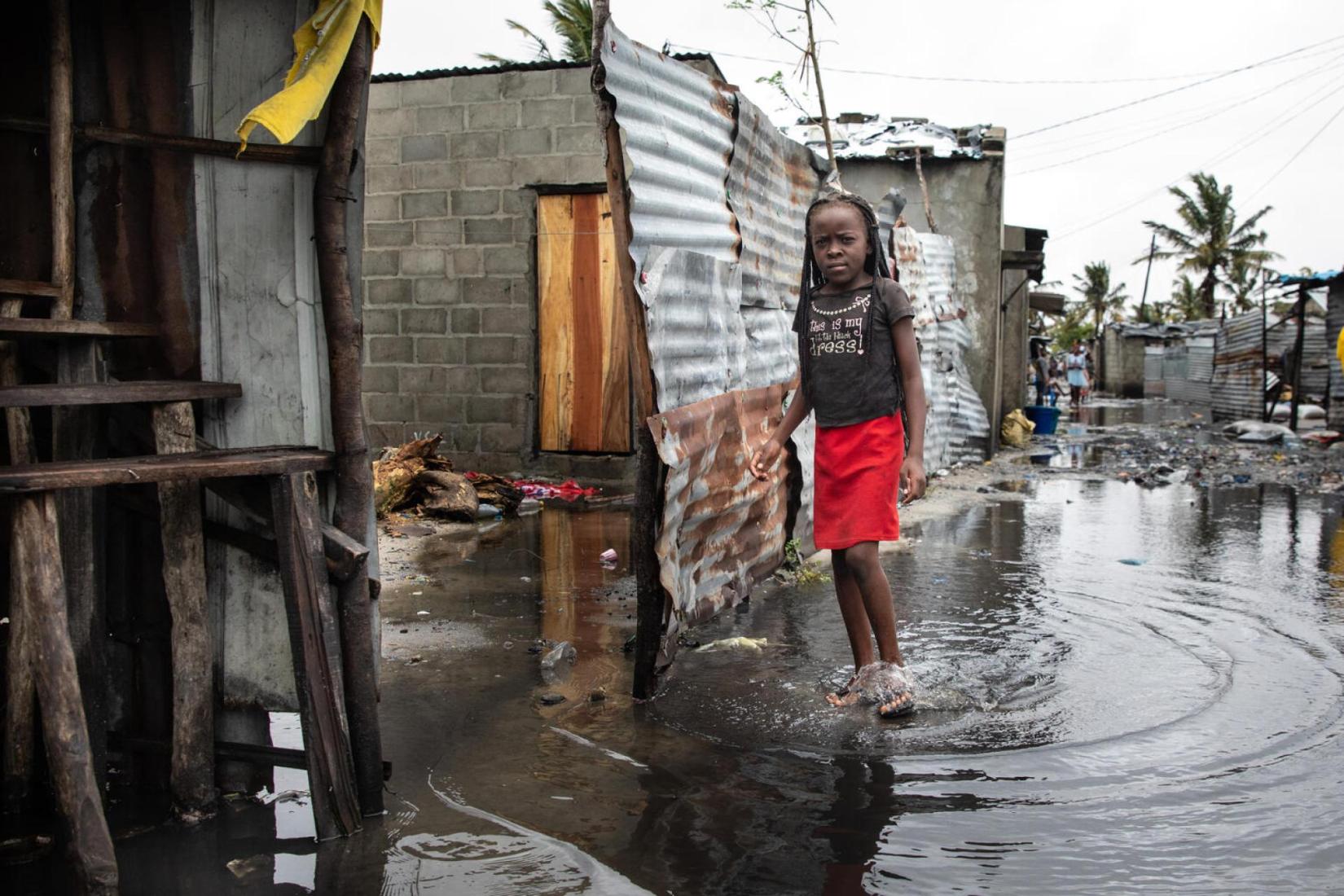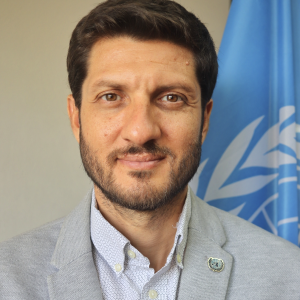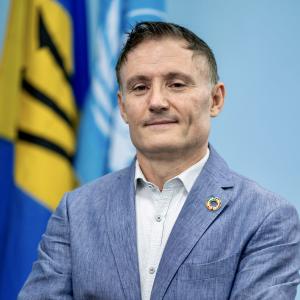“Fighting Inequality for a Resilient Caribbean” | International Day for Disaster Risk Reduction Op-Ed
11 October 2023

By UN Resident Coordinator, Didier Trebucq and Nahuel Arenas, Chief, Regional Office for the Americas & the Caribbean, United Nations office for Disaster Risk Reduction (UNDRR)
In the Caribbean, we share a deep understanding of the intricate link between disasters and inequality. It's a narrative of uneven access to crucial resources, leaving the most vulnerable exposed to the impacts of disasters. When disasters strike, they disproportionately affect marginalized communities, exacerbating existing inequalities and pushing them deeper into poverty. We want to stop this cycle, and this year's International Day for Disaster Risk Reduction is our way of saying, "Let's do something about it!"
The main message is simple: We need to fight inequality to build a stronger and safer future for everyone, because disasters and inequality go hand in hand. Let's work on both of these problems together.
This region faces a range of challenges today—economic uncertainties, widening disparities, supply chain disruptions, energy shortages, price surges, and inflation—all of which cast shadows on economies and livelihoods. Amidst these concerns, disaster risks surge relentlessly. According to the UNDRR’s Global Assessment Report on Disaster Risk Reduction (2022) Our World at Risk: Transforming Governance for a Resilient Future , by 2030, globally, we could be confronting approximately 1.5 significant disasters every single day. An additional estimated 37.6 million people will be living in conditions of extreme poverty due to the impacts of climate change and disasters will push an additional 100.7 million into poverty by 2030.
Recent research paints a stark picture: the poorest bear the heaviest burden when disasters strike. For instance, the deadliest disaster in the Caribbean, the Port-au-Prince Earthquake, impacted the poorest country of the region: Haiti; and its long-term impacts continue to be visible more than a decade later. Between 1970 and 2019, a staggering 91% of all deaths caused by weather, climate, and water hazards occurred in developing countries like the Caribbean. Similarly, the World Bank reports that 82% of disaster-related deaths transpired in low and lower-middle-income countries. A biological hazard, the COVID-19 pandemic, produced one of the costliest losses in the Caribbean resulting in GDP contraction by as much as 16-20 percent in some countries, notably affecting the most vulnerable.
The cumulative impact of climate-related weather incidents has created a clear pattern where vulnerable communities in the Caribbean who already face inequalities are further disproportionately affected. They are facing the harsh realities of disrupted livelihoods, food insecurity, and increased poverty. From 2021-2022, the Caribbean has experienced approximately seven significant events. These occurrences have brought to light the close interconnectedness between climate change, extreme weather events, and economic inequalities in the region.
Furthermore, approximately 75% of extreme weather events are now linked to climate change, primarily fueled by carbon emissions. Ironically, those experiencing the most severe losses from disasters are often those who have contributed the least to the problem. In essence, inequality acts as a conduit, transferring disaster risk from those who benefit from risk-taking to those who bear its costs.
Inequality also plays a pivotal role in determining who bears the brunt of disasters within Caribbean countries and communities. Impoverished communities are more likely to reside in hazard-prone areas, lack the resources to invest in risk reduction measures, live in substandard and insecure housing, and have limited access to essential services such as healthcare, public transport, and basic infrastructure. This situation further exacerbates existing inequalities. Specific populations, including women, children, and persons with disabilities, are disproportionately affected by disaster impacts. For example, studies reveal that women in the Caribbean region are less likely to receive official warnings about impending disasters than men. Similarly, during past disasters, persons with disabilities were often the most vulnerable.
We are rising to the challenge by prioritizing our commitments to the Sendai Framework and the Sustainable Development Goals (SDGs). This entails a resolute reduction of poverty and inequality, alongside resolute action against disaster risk and vulnerability. Our focus remains unwaveringly fixed on the most vulnerable communities, ensuring they receive the protection and support they deserve.
On a global scale, decision-makers are looking at revamping the financial architecture, aligning it to better serve the needs of the world's most vulnerable countries. Economic resilience is critical for those most at risk from disasters, forming an indispensable component of our collective strategy to confront the challenges that lie ahead.
Furthermore, the implementation of the Early Warnings for All initiative, including in Caribbean countries such as Barbados and Antigua and Barbuda, will help to ensure that every corner of the globe is covered by multi-hazard early warning systems within the next four years. By prioritizing the most at-risk communities, we offer them the vital lifeline of preparedness and early warnings.
By engaging in disaster risk reduction, countries will bolster their capacity, and empower diverse groups in all decision-making processes. Women, the elderly, and persons living with disabilities should be at the forefront, and actively included in our efforts. The presence of ‘local,’ ‘national’ and ‘regional’ actors, including state and civil society organisations remains key to humanitarian and resilience “effectiveness” since local actors are often the first responders in an emergency.
As we commemorate this year's International Day for Disaster Risk Reduction, let us recommit ourselves to this formidable challenge. Let us remember that in the face of disaster-induced inequality, we hold the power to reshape the future. Together, we can break these chains, forging a path to resilience and equality for all, for a brighter Caribbean awaits.

Nahuel Arenas-García
During the last 20 years, Mr. Arenas has led humanitarian assistance interventions, DRR programming and development cooperation in different countries in Latin America & Caribbean, Africa and Asia Pacific. Before joining UNDRR, Mr. Arenas occupied the position of Director for Humanitarian Programs and Policy for OXFAM USA.
He has also worked for the Japan International Cooperation Agency (JICA), Action Against Hunger (ACF), consulted for UN-Habitat leading learning processes around DRR programming and contributed to many academic programs including the Harvard Humanitarian Initiative Course: Humanitarian Response to Conflict and Disasters. He has a background in Public Policy (FLACSO) and International Politics (SOAS, Univ. of London) as well as degrees in Crisis Management (Universidad Complutense of Madrid).

Didier Trebucq
Working closely with the national governments covered by the Multi Country Office and sub-regional institutions, the RC advocates with the UNST for the mandates of the UN system and the delivery of the UN Multi Country Sustainable Development Framework (MSDCF). The RC aims to bring together the different UN agencies to improve the coherence, efficiency and effectiveness of operational activities in the Eastern Caribbean region. As UN RC he is also the Designated Official (DO) for Security, responsible for the safety and security of all UN staff and their dependents.
Prior to becoming the Resident Coordinator for Barbados and the OECS, Mr. Didier Trebucq served as UNDP Country Director in Brazil. Previously he was the Deputy Resident Representative for UNDP in Peru and Deputy Resident Representative for UNDP in Guyana. He also worked in UNDP India as Programme Officer & Team Leader of Crisis Prevention and Recovery.
Before joining the UN, Mr. Trebucq worked as Head of Delegation of the French Red Cross in Colombia and Ecuador. Also, he was Administrator of "Médecins Sans Frontières" in Kyrgyzstan and Tajikistan and previously worked as an Executive in the private banking sector in France for five years.
Mr. Trebucq, a development Economist, holds a Master of Science in Sustainable Development, with specialism in Environmental Economics, from Imperial College London (UK) and a Master in Business Administration from the "Institut Français de Gestion" in France. He speaks fluently four languages: French, English, Spanish and Portuguese. He is the father of two sons.





